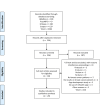Research-Tested Mobile Apps for Breast Cancer Care: Systematic Review
- PMID: 30741644
- PMCID: PMC6388100
- DOI: 10.2196/10930
Research-Tested Mobile Apps for Breast Cancer Care: Systematic Review
Abstract
Background: The use of mobile health (mHealth) apps in clinical settings is increasing widely. mHealth has been used to promote prevention, improve early detection, manage care, and support survivors and chronic patients. However, data on the efficacy and utility of mHealth apps are limited.
Objective: The main objective of this review was to provide an overview of the available research-tested interventions using mHealth apps and their impact on breast cancer care.
Methods: A systematic search of Medline, PsycINFO, Embase, and Scopus was performed to identify relevant studies. From the selected studies, the following information was extracted: authors, publication date, study objectives, study population, study design, interventions' features, outcome measures, and results.
Results: We identified 29 empirical studies that described a health care intervention using an mHealth app in breast cancer care. Of these, 7 studies were about the use of an mHealth application in an intervention for breast cancer prevention and early detection, 12 targeted care management, and 10 focused on breast cancer survivors.
Conclusions: Our results indicate consistent and promising findings of interventions using mHealth apps that target care management in breast cancer. Among the categories of mHealth apps focusing on survivorship, mHealth-based interventions showed a positive effect by promoting weight loss, improving the quality of life, and decreasing stress. There is conflicting and less conclusive data on the effect of mHealth apps on psychological dimensions. We advocate further investigation to confirm and strengthen these findings. No consistent evidence for the impact of interventions using mHealth apps in breast cancer prevention and early detection was identified due to the limited number of studies identified by our search. Future research should continue to explore the impact of mHealth apps on breast cancer care to build on these initial recommendations.
Keywords: breast cancer care; breast cancer management; breast cancer prevention; breast cancer survivorship; mHealth applications; mobile applications.
©Chiara Jongerius, Selena Russo, Ketti Mazzocco, Gabriella Pravettoni. Originally published in JMIR Mhealth and Uhealth (http://mhealth.jmir.org), 11.02.2019.
Conflict of interest statement
Conflicts of Interest: None declared.
Figures
References
-
- Whittaker R. Issues in mHealth: findings from key informant interviews. J Med Internet Res. 2012;14(5):e129. doi: 10.2196/jmir.1989. http://www.jmir.org/2012/5/e129/ v14i5e129 - DOI - PMC - PubMed
-
- Aitken M, Gauntlett C. Patient apps for improved healthcare: from novelty to mainstream. Parsippany (NJ): IMS Institute for Healthcare Informatics; 2013.
-
- Research and Markets. 2017. [2018-12-05]. In mHealth App Market By Type And Segment Forecasts 2014 - 2025 https://www.researchandmarkets.com/reports/4396364/mhealth-app-market-by... .


